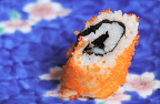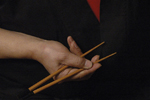 [There is something deliciously creepy about Japanese horror. I was reading the short story “Mujina” from Lafcadio Hearn’s book “Kwaiden” (1904) over my lunch break in a toasty, sun-dappled atrium while sitting in a comfortable chair having the look and feel of an oversized pleather marshmallow, and the story still gave me chills!
[There is something deliciously creepy about Japanese horror. I was reading the short story “Mujina” from Lafcadio Hearn’s book “Kwaiden” (1904) over my lunch break in a toasty, sun-dappled atrium while sitting in a comfortable chair having the look and feel of an oversized pleather marshmallow, and the story still gave me chills!
Playing his version of the Grimm brothers in Japan, Hearn collected and sketched these Japanese tales for us in the West in the early 20thC. I love the double-“gotcha” cut-to-black ending of “Mujina,” worthy of a Twilight Zone episode or as a campfire tale to scare the kids!]
 On the Akasaka Road, in Tôkyô, there is a slope called Kii-no-kuni-zaka, — which means the Slope of the Province of Kii. I do not know why it is called the Slope of the province of Kii. On one side of this slope you see an ancient moat, deep and very wide, with high green banks rising up to some place of gardens; — and on the other side of the road extend the long and lofty walls of an imperial palace. Before the era of street-lamps and jinrikishas, [i.e. “rickshaw”] this neighborhood was very lonesome after dark; and belated pedestrians would go miles out of their way rather than mount the Kii-no-kuni-zaka, alone, after sunset. All because of a Mujina that used to walk there.
On the Akasaka Road, in Tôkyô, there is a slope called Kii-no-kuni-zaka, — which means the Slope of the Province of Kii. I do not know why it is called the Slope of the province of Kii. On one side of this slope you see an ancient moat, deep and very wide, with high green banks rising up to some place of gardens; — and on the other side of the road extend the long and lofty walls of an imperial palace. Before the era of street-lamps and jinrikishas, [i.e. “rickshaw”] this neighborhood was very lonesome after dark; and belated pedestrians would go miles out of their way rather than mount the Kii-no-kuni-zaka, alone, after sunset. All because of a Mujina that used to walk there.
The last man who saw the Mujina was an old merchant of the Kyôbashi quarter, who died about thirty years ago. This is the story, as he told it :—
 One night, at a late hour, he was hurrying up the Kii-no-kuni-zaka, when he perceived a woman crouching by the moat, all alone, and weeping bitterly. Fearing that she intended to drown herself, he stopped to offer her any assistance or consolation in his power. She appeared to be a slight and graceful person, handsomely dressed; and her hair was arranged like that of a young girl of good family. “O-jochû,” [“honorable damsel”] he exclaimed, approaching her,— “O-jochû, do not cry like that!… Tell me what the trouble is; and if there be any way to help you, I shall be glad to help you.” (He really meant what he said; for he was a very kind man.) But she continued to weep,— hiding her face from him with one of her long sleeves. “O-jochû,” he said again, as gently as he could,— “please, please listen to me! … This is no place for a young lady at night! Do not cry, I implore you!— only tell me how I may be of some help to you!” Slowly she rose up, but turned her back to him, and continued to moan and sob behind her sleeve. He laid his hand lightly upon her shoulder, and pleaded:— “O-jochû!— O-jochû!— O-jochû!… Listen to me, just for one little moment!… O-jochû!— O-jochû!”… Then that O-jochû turned round, and dropped her sleeve, and stroked her face with her hand;— and the man saw that she had no eyes or nose or mouth,— and he screamed and ran away.
One night, at a late hour, he was hurrying up the Kii-no-kuni-zaka, when he perceived a woman crouching by the moat, all alone, and weeping bitterly. Fearing that she intended to drown herself, he stopped to offer her any assistance or consolation in his power. She appeared to be a slight and graceful person, handsomely dressed; and her hair was arranged like that of a young girl of good family. “O-jochû,” [“honorable damsel”] he exclaimed, approaching her,— “O-jochû, do not cry like that!… Tell me what the trouble is; and if there be any way to help you, I shall be glad to help you.” (He really meant what he said; for he was a very kind man.) But she continued to weep,— hiding her face from him with one of her long sleeves. “O-jochû,” he said again, as gently as he could,— “please, please listen to me! … This is no place for a young lady at night! Do not cry, I implore you!— only tell me how I may be of some help to you!” Slowly she rose up, but turned her back to him, and continued to moan and sob behind her sleeve. He laid his hand lightly upon her shoulder, and pleaded:— “O-jochû!— O-jochû!— O-jochû!… Listen to me, just for one little moment!… O-jochû!— O-jochû!”… Then that O-jochû turned round, and dropped her sleeve, and stroked her face with her hand;— and the man saw that she had no eyes or nose or mouth,— and he screamed and ran away.
 Up Kii-no-kuni-zaka he ran and ran; and all was black and empty before him. On and on he ran, never daring to look back; and at last he saw a lantern, so far away that it looked like the gleam of a firefly; and he made for it. It proved to be only the lantern of an itinerant soba-seller, who had set down his stand by the road-side; but any light and any human companionship was good after that experience; and he flung himself down at the feet of the old soba-seller, crying out, “Aa!— aa!!— aa!!!“…
Up Kii-no-kuni-zaka he ran and ran; and all was black and empty before him. On and on he ran, never daring to look back; and at last he saw a lantern, so far away that it looked like the gleam of a firefly; and he made for it. It proved to be only the lantern of an itinerant soba-seller, who had set down his stand by the road-side; but any light and any human companionship was good after that experience; and he flung himself down at the feet of the old soba-seller, crying out, “Aa!— aa!!— aa!!!“…
 “Kore! Kore!” roughly exclaimed the soba-man. “Here! what is the matter with you? Anybody hurt you?”
“Kore! Kore!” roughly exclaimed the soba-man. “Here! what is the matter with you? Anybody hurt you?”
 “No— nobody hurt me,” panted the other,— “only… Aa!— aa!“…
“No— nobody hurt me,” panted the other,— “only… Aa!— aa!“…
 “— Only scared you?” queried the peddler, unsympathetically. “Robbers?”
“— Only scared you?” queried the peddler, unsympathetically. “Robbers?”
 “Not robbers,— not robbers,” gasped the terrified man… “I saw… I saw a woman— by the moat;— and she showed me… Aa! I cannot tell you what she showed me!”…
“Not robbers,— not robbers,” gasped the terrified man… “I saw… I saw a woman— by the moat;— and she showed me… Aa! I cannot tell you what she showed me!”…
 “He! Was it anything like THIS that she showed you?” cried the soba-man, stroking his own face— which therewith became like unto an Egg… And, simultaneously, the light went out.
“He! Was it anything like THIS that she showed you?” cried the soba-man, stroking his own face— which therewith became like unto an Egg… And, simultaneously, the light went out.
[Hearn is responsible for linking this particular “haunting” with the mujina (badger) one part of the Japanese animal shape-shifting trio of badger, fox and tanuki (raccoon-dog) who all seem to delight in playing mind games on humans. The true name of this uniquely Japanese haunting is Noppera-Bo or “Faceless Ghost.” Much thanks to the Hudson Public Library for ordering me a copy of “Kwaiden.”]






























